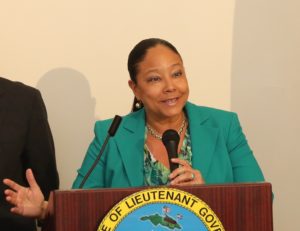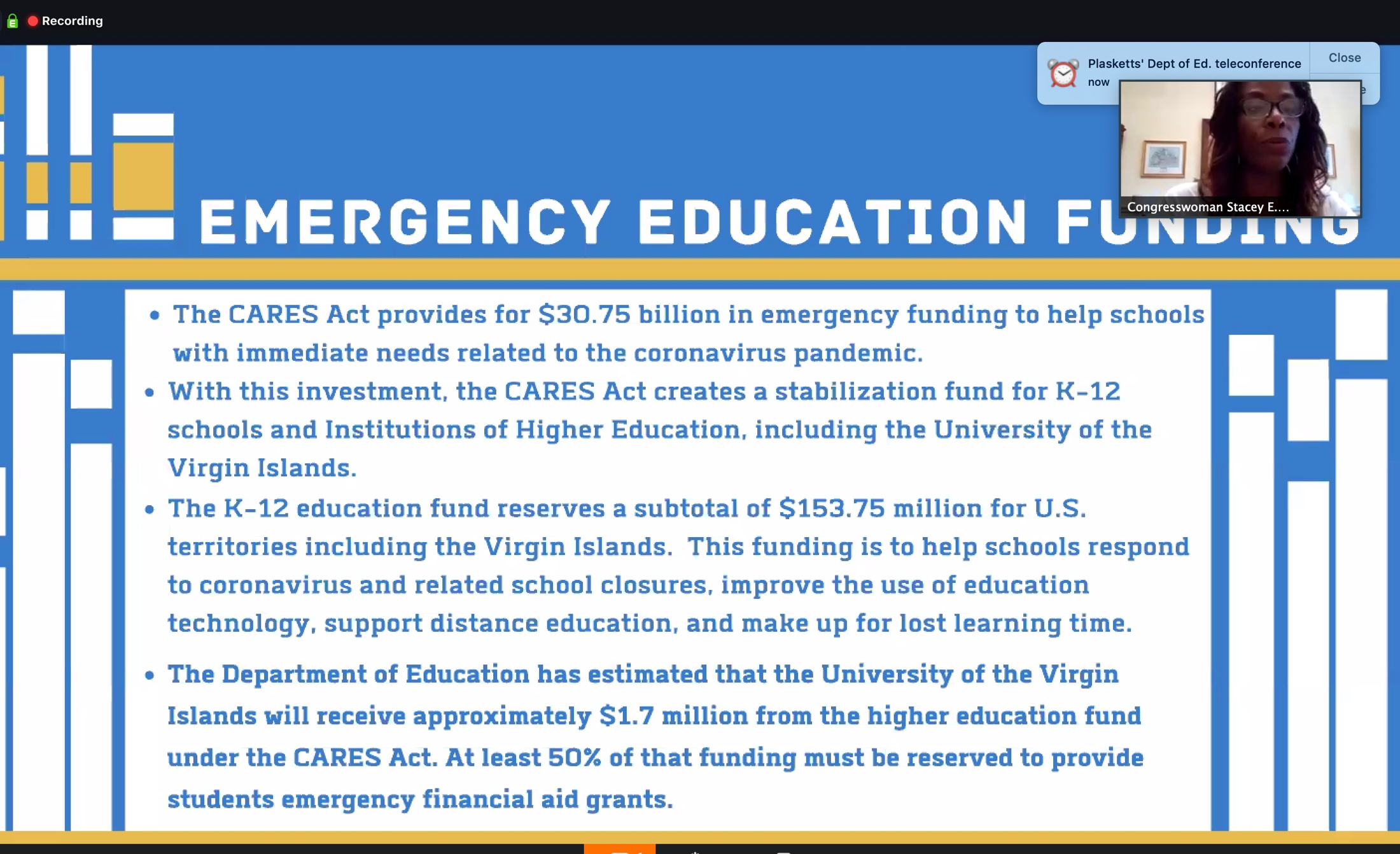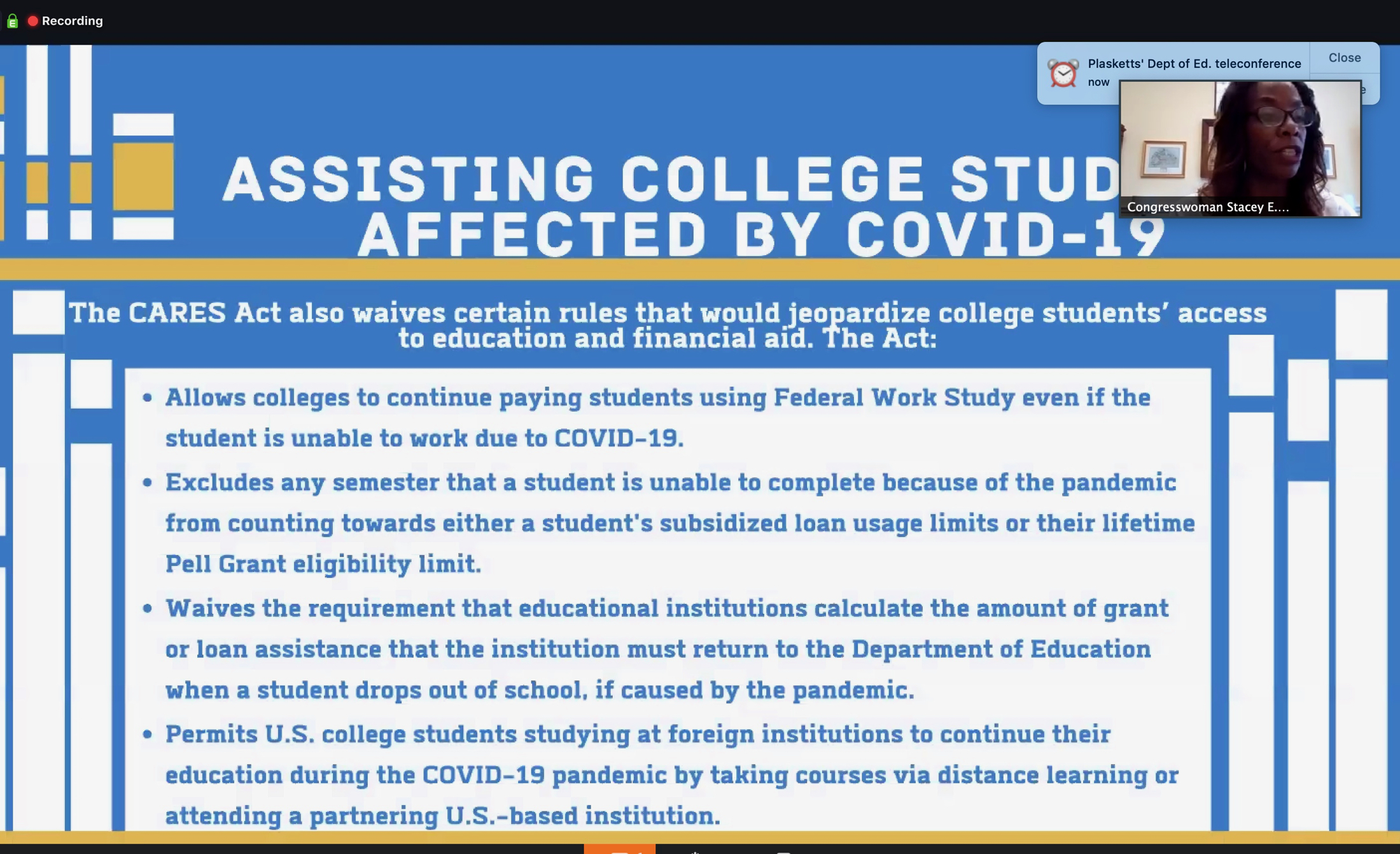
“Parents, you got this!’”
Principal Lisa Hassell-Forde from Addelita Cancryn Jr. High School called out those words of encouragement during a one-hour webinar on distance learning for parents, teachers and students.
The session was hosted Tuesday by Delegate to Congress Stacey Plaskett.
“Parents, you were their first teacher. You taught them their colors, you taught them potty training. It’s just a matter of figuring out what’s working and what’s not,” Hassell-Forde continued.
Hassell-Forde was one of five educators invited to share their ideas and resources for continuing the school year through distance learning. The one-hour webinar was packed with information for teachers and parents of students ranging from in age from tots to college.
At the beginning and end of the session, Plaskett outlined the federal financial assistance available to the territory and its residents through the CARES Act – which stands for the Coronavirus Aid, Relief and Economic Security Act. The measure was passed by Congress and signed into law by President Donald Trump on March 26. (Information from the webinar on the act’s features for education appears below.)
Hassell-Forde focused her presentation on what parents can do now that the Department of Education has announced that schools will remain closed for the remainder of the 2019-20 school year.
She began with a pep talk, reminding parents that according to Education Week, 55 million school children throughout the United States are affected by school closings caused by the COVID-19 pandemic. Hassell-Forde said she wanted to avoid the word “crisis” because that word “makes it sound that the situation is out of control,” but acknowledged that “the weight of student learning is now on parents.”
She urged parents not to simply leave their children free to play, but to create a dedicated space for children to engage in schoolwork, whether a separate room or just a place at the kitchen table, and set up a schedule so that they won’t be interrupted.
She suggested putting kids together for some assignments, and giving children breaks – if it’s only time to “jump up and down on the porch” to find a balance between work and play.
Hassell-Forde reminded parents that not all learning has to be done on the computer. Children can practice their times tables by reciting them to an older sibling or quietly read to themselves or to a younger member of the family. Parents can set an example by setting up a time when the family can quietly read together.
She urged parents to keep in touch with other parents though school Facebook pages or other means as a way of keeping tabs on the kids’ assignments and maintaining their own positive attitudes.
Michaelrose Ravalier, a science teacher at Ivanna Eudora Kean High School and the 2020 Teacher of the Year for the St. Thomas-St. John District, asked listeners to imagine themselves as a teenager.
“You’re thinking you’re invincible. Life is just bubbly. You’re curious, adventurous, full of energy – and quarantined. It’s definitely a challenge.”
As she held up a pair of leopard-spotted pajamas to the camera, Ravalier said teenagers should not be allowed to hang out in their pajamas all day.
“Tell them to be intentional about planning [their] work and working [their] plan.”
She asked parents to help their children schedule time for “sleep, productive learning, physicality and privacy,” and allow them space to feel their disappointments and losses at this time.
“Treat them as problem-solvers, and season your interactions with humor,” she said.
Being isolated with family members is the perfect time to learn about one’s family, Ravalier said.
“Let’s be patient with each other; have faith, not fear. We will get through this together V.I. Strong,” she said.
Valrica Bryson, a music educator and director of Cultural Education for the V.I. Department of Education, picked up on Ravalier’s recommendation to share family stories and cultural knowledge.
“Find out about your family tree. Zoom with your grandparents. Learn how to crochet, jump rope, tell stories, play jacks – all it takes is a ball and some small rock stones.”
Bryson said with parental guidance, youngsters “will come out of the pandemic knowing who they are.”
Zarah O’Reilly Bates, an elementary teacher at Ricardo Richards Elementary School and the 2020 Teacher of the Year for the St. Croix District, had advice for teachers as they navigate the complexities as distance learning facilitators.
She urged teachers to take advantage of Microsoft 365 Class notebook which allows students to upload their work privately into a class notebook and communicate with students without having their personal email accounts bombarded with student messages.
She said since teachers were using a number of online platforms, there was a need to form professional learning communities and establish norms for online learning.
Whatever platforms they choose, teachers should model for their students how to interact with the platforms, and show users how to press the “Help” icon when they have a problem. “We all make mistakes, that’s the beauty of learning,” she said.
O’Reilly-Bates asked teachers to involve parents as well. “Parents are your best assets,” she said.
Lastly, Cheryl Lederle, an educator with the Library of Congress, led webinar participants through a quick tour of the Library of Congress website. “The Library of Congress has more than 800 miles of shelf space, and much of it is digitized and free for use and reuse. There are webinars for teachers and additional resources for students. If a student needs extra help finding information, there’s an icon to click to “Ask a Librarian.” “They’re standing by, willing and excited to answer – but not your homework questions. They’ve got pretty good radar for that sort of thing.”
According to Commissioner of Education Raquel Berry-Benjamin, “While many teachers have already begun engaging their students through remote conferencing services, such as Office 365 Teams and Zoom, beginning Tuesday, April 14, more schools will move to the expanded use of online educational platforms already in V.I. classrooms, including Edmentum, Accellus, and iReady.
“In order to understand students’ access to technology at home, the Department conducted a survey in early March that indicated 82 percent of students territory-wide have internet access at home and 66 percent of students own a handheld computer or Smartphone (see full survey results below). To address the needs of students without access to technology at home, the VIDE has leveraged currently available federal funds and reprogrammed monies to secure internet access and other technologies for students requiring it. Each school district will provide those students with a laptop or Chromebook as early as next week.
Following the webinar, Plaskett thanked participants and gave an overview of how the CARES Act will assist administrators, teachers, parents and students in the territory.
“The CARES Act creates a stabilization fund for K-12 schools and Institutions of Higher Education, including the University of the Virgin Islands.
“The K-12 education fund reserves one-half of one percent for schools in the small territories of the United States, including the Virgin Islands, Guam, American Samoa and Northern Mariana. So, there is a subtotal of $153.75 million for these territories. This funding is to help schools respond to coronavirus and related school closures, meet the immediate needs of students and teachers, improve the use of education technology, support distance education, and make up for lost learning time.
“Additionally, the U.S. Department of Education has estimated that the University of the Virgin Islands will receive approximately $1.7 million from the higher education fund under the CARES Act. At least 50 percent of that funding must be reserved to provide students emergency financial aid grants.”
Plaskett said the coronavirus pandemic is “revealing new levels of inequity in education” and she is working with other members of Congress to close the digital divide. The Department of Education is conducting research to determine which students need access to computers and internet connectivity to continue their studies through distance learning. The Dept. of Education is committed to providing equipment and connectivity to all students.
WTJX is now providing instruction for students at all grade levels throughout the day on Channel 12.
Editor’s note: This has been updated to add information about USVI student levels of computer and smartphone ownership, and plans to issue laptops.
New eTeacher Network to Provide Students Access to Learning Through Public TV, Radio








